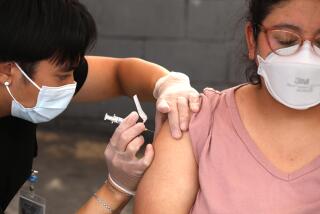Just When Is a Sick Person Contagious?
Catching the flu is a matter of bad luck and, sometimes, a bad education about health and hygiene.
Go ahead. Test your knowledge.
Which of these sick people is probably contagious?
A) Someone who will come down with symptoms of the flu in 12 hours.
B) Someone who is feeling the first tingling of a sore throat.
C) Someone who has been taking antibiotics for bronchitis for two days but is still coughing heavily.
The answer? B.
Many of the winter respiratory illnesses caused by viruses are highly contagious, says Dr. Shirley Fannin, director of disease control for the county Department of Health Services. But that doesnât mean youâre doomed if people in your family or at work are sick.
Most of the time, the contagion accompanies obvious symptoms. So, if you know someone who looks sick and acts sick, you should avoid him or her like the plague.
âDuring the time you are having symptoms, you are contagious. It usually lasts three to four days,â Fannin says.
The common cold starts with small, annoying symptoms but builds over a matter of days. You are contagious from the start.
Influenza spreads easily because the victim is contagious a few hours before the first symptom appears.
âThe incubation period for influenza is very short,â Fannin says. âInfluenza is contagious within a matter of a few hours before the onset of symptoms. You can be exposed today and, by tomorrow, be infected.â
If someone in your family has just come down with symptoms of the flu, you can quickly seek an antiviral medication, such as amantadine, to reduce your risk. This strategy works some of the time, Fannin says.
âThis probably decreases the number of viruses, but it doesnât eliminate them,â she says.
Bacterial illnesses, which include bronchitis and sinusitis and are usually identifiable by the yellow or green tinge of nasal or throat mucus, act a little differently than viruses, Fannin says.
âWith bacterial illnesses, you can be contagious for longer periods of time if you donât take antibiotics. If you are taking antibiotics, you are probably not contagious after 24 hours,â she says.
This is true even if you are still hacking and causing everyone in your office to say, âUgh, go home!â
âThe bacteria is killed off, but you still have irritated and damaged tissue and that takes longer to heal,â Fannin explains.
The other nice thing about bacterial illnesses is they donât travel through the air as easily as viral illnesses. Viruses, on the other hand, spread like a Southern California wildfire because they permeate the air.
âViruses are spread by airborne respiratory particles,â Fannin says. âWhen you cough or sneeze, you propel some tiny particles into the air. Because these particles are small, they hang suspended for long periods of time--for an hour or two. People who inhale that air, inhale the particles.â
Gross.
But if you havenât had the flu yet, you have another reason to be hopeful. In Southern California, indications are that this is a lighter than usual flu season.
(BEGIN TEXT OF INFOBOX / INFOGRAPHIC)
Keep It to Yourself
Tips to avoid spreading winter respiratory illnesses:
* Use those sick days. If you have heavy symptoms, stay home at least two or three days.
* Go to the doctor and get antibiotics if you have symptoms of a bacterial infection. Remain at home one day after starting the antibiotics.
* Cough and sneeze into thick, disposable tissues, then dispose of the tissues promptly and properly. (Covering your mouth with your hand helps a bit but not as much as using a tissue.)
* Wash your hands--using soap--often.
* If you cough or sneeze on your clothes, change your clothes.
* Change or wash towels and sheets frequently to reduce spreading illness throughout the household.


